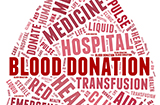Donating Blood: The Process
Whether it’s the needles, the amount of time, or even the blood itself, less than 10% of the population eligible to donate blood does so. Even though many feel uncomfortable donating blood, there are almost no risks, except a minor pinch from the needle at the beginning of the donation.
Donated blood is given to a variety of people with different needs—from cancer patients to persons having surgeries and transplants to accident victims.
Feel more at ease and more open to giving blood by learning a little bit more about blood donation process.
Before
- Eat healthy foods about four hours before donating, staying away from greasy foods.
- Hydrate—drink about 16 ounces of water or nonalcoholic juices.
- Sleep well the night before.
- Don’t take aspirin for two days beforehand if you’re donating platelets.
- Bring a photo ID, such as driver's license or school ID, and a list of any medications you currently take.
During
- Wear a short-sleeved shirt or one that can have its sleeves easily rolled above the elbow.
- Stay calm, and remember there are almost no risks to you.
- Tell the technician if you have an arm preference.
- Right after donating, eat and drink the provided snacks and beverages.
After
- Continue to drink fluids, but do not drink alcohol for 24 hours.
- Avoid doing intense exercises or heavy weight lifting for that day.
- Within the following hour, take off the wrap bandage, if one was put on your arm. However, leave the strip bandage on for the next several hours.
- Use soap and water to clean your arm near the bandages—this will help to avoid a skin rash.
- If you begin to bleed from the needle prick, then put pressure on it and hold your arm straight up until it stops bleeding.
- Sit or lie down if you start feeling dizzy or lightheaded.
To find out if you’re eligible to give blood and for more information, please visit the American Red Cross’ Eligibility Requirements.
Adapted and excerpted from:
“About Blood: Facts & Figures,” America’s Blood Centers (Accessed 01/2015).
“Blood Donation FAQs,” The University of Texas MD Anderson Cancer Center (Accessed 01/2015).
“Tips for Successful Donation,” American Red Cross (Accessed 01/2015).

Related Sites & Articles
- Hot Topics
- Food Safety: Tips for College Students
- Heart Health
- Other Sites & Publications
- Blood Facts and Statistics—American Red Cross
- What Is Blood—America's Blood Centers

